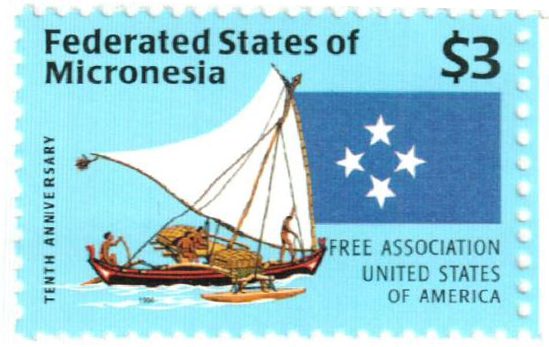On September 28, 1990, the USPS released two joint-issue stamps commemorating the 1986 compact of free association with Micronesia and the Marshall Islands.
During World War II, Japan established a powerful empire based in the Pacific Ocean. After the war, many small island groups were left without a government, and did not have the resources to rule themselves. In 1947, the United Nations established the Trust Territory of the Pacific Islands. Administered by the U.S. government, the territory consisted of the Marshall Islands, the Northern Mariana Islands (except Guam), the Federated States of Micronesia, and the Palau Islands.
In the 1980s, the U.S. and the Trust Territory developed the Compact of Free Association (COFA). This compact was an agreement in which the U.S. government agreed to help each of the included nations to develop their own self-governments and become independent as they saw fit. However, the U.S. would provide access to federal emergency management agencies as well as the National Weather Service, USPS, and the Federal Communications Commission, among others. The compact was approved by Micronesia and the Marshall Islands in 1986. It was several years before Palau was able to approve the compact and the Northern Marianas instead chose to become a U.S. commonwealth.

The U.S. joint issue honoring this compact was originally intended to include four stamps honoring each of the countries involved, but it was eventually narrowed down to two honoring the Marshall Islands and Micronesia. In addition to two U.S. stamps, Micronesia would issue a strip of three and the Marshall Islands a single stamp. Two artists designed all six stamps, which were in turn printed by two different processes by three different printers.

All six stamps feature similar designs – a historic ship from one or more of the countries plus a flag. The Micronesia issue included a stamp honoring the U.S. with the American flag and the USS Constitution. The Marshall Islands stamp also includes a stick chart, which is a device used to teach people how to navigate by reading wave patterns.
The first day ceremony for all six stamps was held at the Dean Acheson Auditorium in the Department of State in Washington, D.C., on September 28, 1990. Ceremonies were also held at Palikir, Pohnpei, Micronesia, and Majuro in the Marshall Islands.
Click here to read the text of the compact.
Click here to see what else happened on This Day in History.




Eniwetok is one of the atolls making up the Marshall Islands. It was captured from the Japanese in 1944 and was being used by the US Navy in the summer of 1945 as one of the major locations of Navy ships assembling for the planned November invasion of Japan as the final battle of WWII. My ship was one of the several hundred ships anchored inside the deep lagoon of the circle of coral islands making up the atoll. But the atom bomb in August 1945 ended the war, and our ship was eventually routed to Norfolk, Virginia, for decommissioning which happened in December, 1945. The original inhabitants of Eniwetok had all been transferred to other islands, so the Navy started to use it as a bomb test site, setting off the firsst hydrogen bomb in Eniwetok in 1952. Its islands were uninhabitable for years because of the residual radioactivity. Eventually some natives returned. Present population 850. The massive U.S. radioactive cleanup effort is still going on with final cleanup expected by 2027.
Fascinating! Thanks for all this valuable information on these special stamps. And the bit on the “stick chart” was enlightening. Who would have thought that we could read the waves and navigate with this knowledge.
Great history that should be published about USA handling free people:)
these two stamps tell an important story with which so few Americans are familiar….how great if everyone was familiar with this piece of our history. Thank for posting them for “today”. — JWS
Wow, what a great personal story!
Learn something new every day. I had no idea about the islands. Keep up the good work Mystic.
I come from China. My father used to work on the Island of Yap in FSM for 2 years in the 1990s.
That’s when I got letters from him and collected a lot of Micronesia stamps, including these. I have collected FSM stamps ever since.